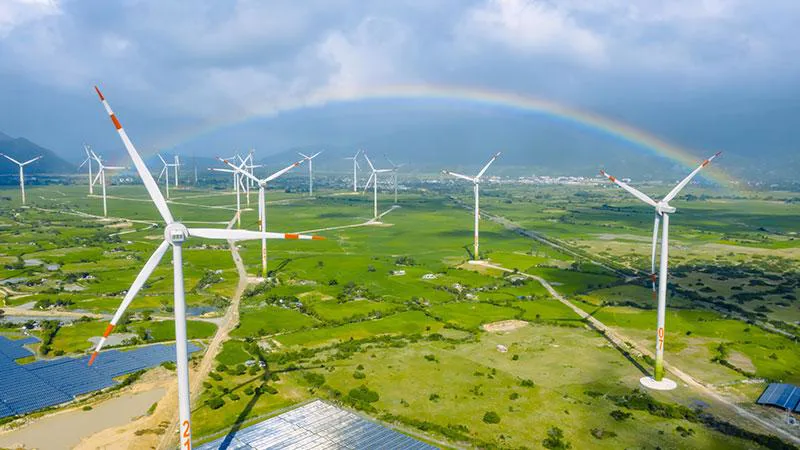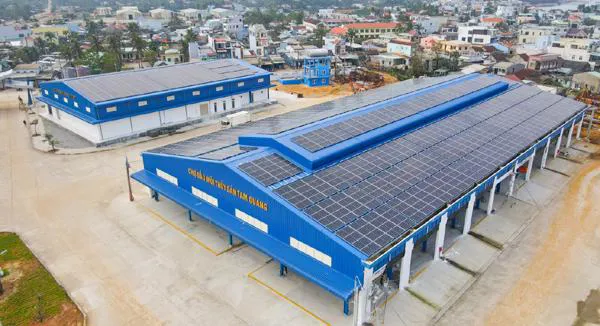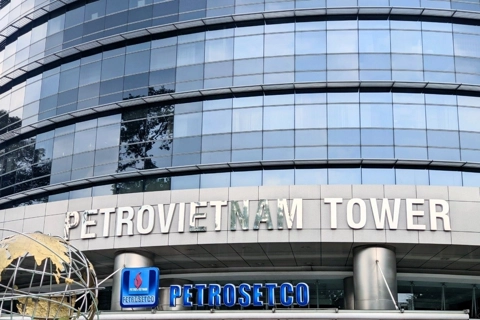International partners keen on Vietnam's renewable energy sector
Vietnam's foreign partners, such as AmCham and EuroCham, expect to further penetrate the domestic clean energy industry.
Vietnam’s renewable energy sector remains attractive to international businesses, officials said on March 19 as they urged the Government to finalize the regulatory system soon.
| A wind power farm in the southern central province of Binh Thuan. Photo: Trung Nam Group |
According to Gregory Testerman, Chairman of the Board of Governors of the American Chamber of Commerce in Vietnam, US companies are looking for solutions in renewable development, especially gas-fired power, and offshore wind projects.
Gregory said that Vietnam needs to prioritize sustainable energy sources at reasonable prices, adding that the nation will need technical and financial assistance to transition energy.
AmCham Vietnam hopes to reach an agreement with the Vietnamese Government on power trade to cut carbon emissions and bring the economy into a state of sustainability, he said.
Kenneth Atkinson, Chairman of the British Business Group Vietnam (BBGV), said that the Vietnamese Government should soon finalize the national Power Development Plan VIII, in which renewables are critical to reducing the impacts of power production on the environment.
The signing of the Just Energy Transition Partnership (JETP) in December 2022 indicates the interest of Vietnam’s international partners to assist the nation in achieving ambitious targets in its climate change policy, he said.
Under the Partnership between Vietnam and international partners signed in December 2022, Vietnam will be financed with US$15-16 billion annually until 2030. The nation will have to curb the annual power production emissions and coal-fired power output by a maximum of 20%-30% and raise the proportion of renewable energy output in the nationwide total by 11% to 47% in 2030.
Kenneth suggested that Vietnam will have to introduce a proper policy on private-public partnership (PPP) as it needs huge capital to finalize energy transition projects.
British enterprises may arrange both direct and indirect capital provisions for Vietnam-based sustainable business projects, the BBGV chairman said. British-based lenders Standard Chartered Bank and HSBC Bank have pledged to provide US$20.5 billion for Vietnam-based projects until 2030.
John Rockhold, Chairman of the Power and Energy Working Group within the Vietnam Business Forum, said that Vietnam may lose around 12-14.5% of its GDP or an accumulation of US$400-523 billion in 2050 due to global warming and emissions.
To offset the cost, Vietnam will need some US$368 billion in the next 18 years, which consists of US$254 billion to deal with climate change, US$219 billion to upgrade private and public infrastructures and US$114 billion to reduce carbon emissions, meet the demand of energy, and realize social development projects, he projected.
Vietnam needs a strong improvement of policies, and infrastructures are required to access the global finances and facilitate its socio-economic transition, he said, adding that private investors should have better conditions to operate in Vietnam-based green projects.
According to Michele Wee, Chairwoman of the Banking Working Group, Vietnam must have the right solution to adopt green energy and green finance for potential projects and facilitate the growth of the green financial market.
She said that the Power Development Plan VIII legislators would have to specify the projects and their expected progress and rule the standard terms for investors to be qualified to make bank loans.
The accomplishment of a green economy may enable Vietnam to take full advantage of its free trade and investment protection agreements with the European Union (the EVFTA and the EVIPA), Gabor Fluit, Vice Chairman of the European Chamber of Commerce in Vietnam (EuroCham Vietnam), said.
| Solar power panels installed on the roof of a fishery processing plant in central province of Quang Nam. Photo: The Hanoi Times |
To foster bilateral trade relations between Vietnam and Europe, EuroCham Vietnam is willing to assist the nation to access advanced technologies and international finances, he told the Vietnam Business Forum (VBF) 2023.
As the use of renewable energy will have a huge impact on the future, the Government should encourage more private investments to reduce carbon emissions and promote the use of clean energy, Gabor said.
Minister of Industry and Trade Dang Hoang An said that the ministry has been working hard to finalize the Power Development Plan VIII and the Master plan on the national energy development in 2021-2030 with a vision to 2050.
The two plans will assure energy security, propel the energy transition so that Vietnam is able to fulfill its commitments in 2050, and produce affordable, accessible power for every Vietnamese person and business.
To achieve its set targets, the ministry is amending the laws on electricity and the efficient use of energy and compiling a new law on renewable energy and domestic renewables to raise economic resilience and curb power production costs.
Prime Minister Pham Minh Chinh said the Vietnamese Government agreed that green growth must involve all societal entities, especially enterprises and people, and boost the implementation of private-public partnership (PPP) projects.
“The Government commits to providing favorable conditions for the enterprise community regarding the improvement of policies and assurance of fairness for all businesses,” he said.
“We will work to find solutions to cut expenses for businesses, improve transparency and equality among all companies, implement proper rules to support business development, and improve the quality of government officials,” he promised.













